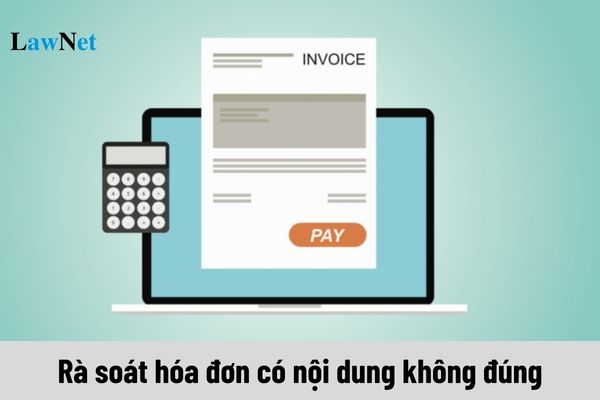General Department of Taxation of Vietnam: Are invoices with incorrect contents considered e-invoice fraud?
Is incorrect contents on invoices considered e-invoice fraud in Vietnam?
According to Official Dispatch 5255/TCT-TTKT of 2024, which provides guidance on signs that may indicate e-invoice fraud.
The document clearly states a continuous enhancement of information technology solutions to detect and promptly prevent illegal buying and selling of invoices or the illegal use of invoices to legitimize input expenses, evade taxes, and exploit value-added tax (VAT) refunds from the state budget.
The General Department of Taxation requests the Tax Departments to implement the following:
(1) The Director of the Tax Department should thoroughly understand the tasks and organize specific task assignments to each official, team, division, and district tax department to review and cross-check based on the list of enterprises with suspicious invoice or tax declaration activities identified by the information technology applications of the industry, the local Tax Department’s self-developed tools that support identifying high-risk enterprises.
During the review and data cross-checking of taxpayers, consideration should be given to the following:
- Recording invoice contents incorrectly as stipulated in Clause 7 Article 3 and Article 10 of Decree 123/2020/ND-CP on invoices, documents.
- Having multiple adjusted and supplemented VAT declarations.
- Reviewing and verifying the accuracy and legitimacy of additional tax declaration dossiers between: the supplementary declaration and the explanation for the supplementary declaration, and related documents as stipulated in Article 47 of the Law on Tax Administration 2019 and Clause 4 Article 7 of Decree 126/2020/ND-CP.
- Reviewing invoices that taxpayers have overlooked and not declared over many periods but now declare additionally; such additional declarations should comply with current regulations.
After reviewing, if the Tax Department identifies enterprises with high tax risk indicators or invoice-related risks, the Tax Department will conduct an immediate inspection at the Tax Department or include it in the audit plan at the taxpayer's headquarters and proceed as regulated.

General Department of Taxation of Vietnam: Are invoices with incorrect contents considered e-invoice fraud? (Image from the Internet)
How much is the value of goods without sales invoice in Vietnam?
According to Clause 1 Article 90 of the Law on Tax Administration 2019 regarding principles of creating, managing, and using e-invoices as follows:
Principles of Creating, Managing, and Using e-invoices
1. When selling goods or providing services, the seller must create e-invoices to deliver to the buyer in the standard data format and must record all contents as prescribed by tax law and accounting law, regardless of the value of each sale or service provision.
...
Simultaneously, according to Clause 1 Article 4 of Decree 123/2020/ND-CP, it is stipulated as follows:
Principles of Creating, Managing, and Using Invoices and Documents
1. When selling goods or providing services, the seller must create invoices to give to the buyer (including goods and services used for promotion, advertising, samples; goods or services as gifts, donations, exchanges, or used to pay wages to employees and internal consumption not including goods in internal circulation for further production); and must record all the required contents as stipulated in Article 10 of this Decree, in the case of using e-invoices, it must comply with the standard data format specified by the tax authority according to Article 12 of this Decree.
...
Thus, there is currently no regulation on a minimum monetary value below which an invoice is not required. When selling, the seller must always issue an invoice to the buyer, regardless of the order value.
What are regulations on types of invoices in Vietnam?
Based on Article 8 of Decree 123/2020/ND-CP, the types of invoices are defined as follows:
Types of Invoices
Invoices prescribed in this Decree include the following types:
1. Value-added tax invoices are for organizations declaring VAT under the credit method for the following activities:
a) Sale of goods, provision of services domestically;
b) International transportation activities;
c) Export to free trade zones and cases considered as exports;
d) Export of goods, provision of services abroad.
2. Sales invoices are intended for organizations and individuals as follows:
a) Organizations or individuals declaring VAT using the direct method for the following activities:
- Sale of goods, provision of services domestically;
- International transportation activities;
- Export to free trade zones and cases considered as exports;
- Export of goods, provision of services abroad.
b) Organizations or individuals in free trade zones when selling goods, providing services domestically, and selling goods, providing services between organizations and individuals within free trade zones to one another, exporting goods, supplying services abroad, the invoice must indicate “For organizations and individuals in free trade zones.”
3. e-invoices for selling public assets used in transactions for the following assets:
a) Public assets at agencies, organizations, units (including housing owned by the state);
b) Infrastructure assets;
c) Public assets managed by enterprises which are not included in state capital in enterprises;
d) Assets from projects using state capital;
ddf) Assets under national ownership;
e) Public assets confiscated by decision from competent authorities;
g) Materials, resources recovered from the disposal of public assets.
4. e-invoices for selling national reserve goods used when agencies or units within the national reserve system sell national reserve goods according to legal provisions.
...
Therefore, currently, there are 4 types of invoices:
- Value-added tax invoices
- Sales invoices
- e-invoices for selling public assets
- e-invoices for selling national reserve goods
In addition to these invoices, there are also other kinds, including:
- Stamps, tickets, cards with forms and contents specified in this Decree;
- Charging receipts for air transport; international transport service charge receipts; banking service fee receipts except when the stamps, tickets, cards are formatted according to international customs and related legal provisions.

